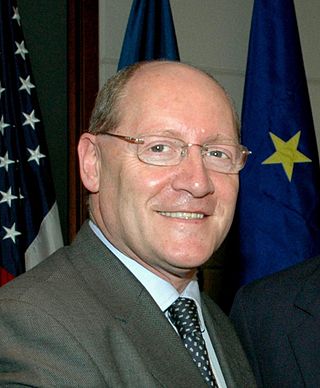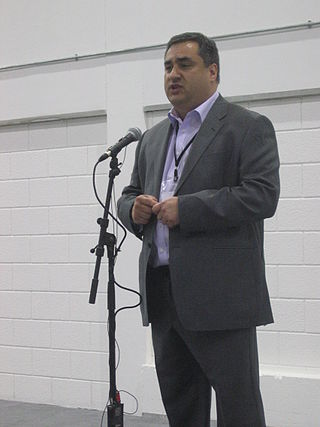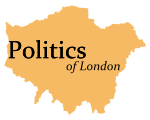
Richard Michael Barnes is a British politician, who was the Deputy Mayor of London from 2008 to 2012. A former member of the Conservative Party, Barnes served as the Leader of the Conservatives on the London Assembly from 2007 to 2008, and was the Member of the London Assembly (AM) for Ealing and Hillingdon from 2000 to 2012, when he lost his seat to Labour. On 30 September 2014, Barnes defected to the UK Independence Party (UKIP).

The first elections for members of the London Assembly were held on 4 May 2000, alongside the first mayoral election.

An election to the Assembly of London took place on 10 June 2004, along with the 2004 London mayoral election.

The 2004 European Parliament election was the United Kingdom's part of the wider 2004 European Parliament election which was held between 10 and 13 June 2004 in the 25 member states of the European Union. The United Kingdom's part of this election was held on Thursday 10 June 2004. The election also coincided with the 2004 local elections and the London Assembly and mayoral elections. In total, 78 Members of the European Parliament were elected from the United Kingdom using proportional representation.

The 2008 London mayoral election for the office of Mayor of London, England, was held on 1 May 2008. Conservative candidate Boris Johnson defeated incumbent Labour Mayor Ken Livingstone. It was the third London mayoral election, the previous elections being the first election in May 2000 and the second election in June 2004.
There are four types of elections in Wales: elections to the House of Commons of the United Kingdom, elections to the devolved Senedd, local elections to community councils and the 22 principal areas, and the Police and Crime Commissioner elections. In addition there are by-elections for each aforementioned election. Elections are held on Election Day, which is conventionally a Thursday. Since the passing of the Fixed-term Parliaments Act 2011 for UK general elections, all four types of elections are held after fixed periods, though early elections to the UK parliament can occur in certain situations, with Senedd elections being postponed to avoid elections to the UK parliament and Senedd coinciding with each other.

An election to the Assembly of London took place on 1 May 2008, along with the 2008 London mayoral election. The Conservatives gained 2 seats, Labour gained one seat, the Liberal Democrats lost two seats, and UKIP were wiped out. Notably, a candidate for the British National Party (BNP) was elected for the first time.
Electoral reform is a change in electoral systems which alters how public desires are expressed in election results.

There are five types of elections in the United Kingdom: elections to the House of Commons of the United Kingdom, elections to devolved parliaments and assemblies, local elections, mayoral elections, and police and crime commissioner elections. Within each of those categories, there may also be by-elections. Elections are held on Election Day, which is conventionally a Thursday, and under the provisions of the Dissolution and Calling of Parliament Act 2022 the timing of general elections can be held at the discretion of the prime minister during any five-year period. All other types of elections are held after fixed periods, though early elections to the devolved assemblies and parliaments can occur in certain situations. The five electoral systems used are: the single member plurality system (first-past-the-post), the multi-member plurality, the single transferable vote, the additional member system, and the supplementary vote.

The London Assembly election of 2012 was an election of members to the London Assembly which took place on Thursday, 3 May 2012, the same day as the 2012 London mayoral election, and the 2012 United Kingdom local elections. Although Conservative candidate Boris Johnson won the Mayoral election, the Assembly election produced the Labour Party's best result since the inception of the London Assembly; this was subsequently surpassed by the party's performance in the 2016 election.

The 2012 police and crime commissioner elections were polls held in most police areas in England and Wales on Thursday 15 November. The direct election of police and crime commissioners (PCCs) was originally scheduled for May 2012 but was postponed in order to secure the passage of the Police Reform and Social Responsibility Act 2011 through the House of Lords. The government considers the elected commissioners to have a stronger mandate than the "unelected and invisible police authorities that they replace". The elections took place alongside by-elections for the House of Commons in Cardiff South and Penarth, Corby and Manchester Central, and a mayoral election in Bristol.

The 2013 United Kingdom local elections took place on Thursday 2 May 2013. Elections were held in 35 English councils: all 27 non-metropolitan county councils and eight unitary authorities, and in one Welsh unitary authority. Direct mayoral elections took place in Doncaster and North Tyneside. These elections last took place on the 4 June 2009 at the same time as the 2009 European Parliament Elections, except for County Durham, Northumberland and the Anglesey where elections last took place in 2008.

The 2016 London mayoral election was held on 5 May 2016 to elect the Mayor of London, on the same day as the London Assembly election. It was the fifth election to the position of mayor, which was created in 2000 following a referendum in Greater London. The election used a supplementary vote system.

The 2016 National Assembly for Wales election was held on Thursday 5 May 2016, to elect members (AMs) of the National Assembly for Wales, now known as the Senedd. It was the fifth election for the National Assembly, the third election taken under the rules of the Government of Wales Act 2006 and the first since the Wales Act 2014.

The 2016 London Assembly election was an election held on 5 May 2016 to elect the members of the London Assembly. It took place on the same day as the London mayoral election and the United Kingdom local elections. Four parties had AMs in the previous Assembly: London Labour led by Len Duvall, London Conservatives led by Gareth Bacon, London Greens led by Siân Berry, and the London Liberal Democrats led by Caroline Pidgeon.

The South Yorkshire Police and Crime Commissioner was the police and crime commissioner of the South Yorkshire Police in South Yorkshire.

David Michael Kurten is a British politician who has served as leader of the Heritage Party since September 2020. He was previously a member of the London Assembly (AM) for Londonwide from 2016 to 2021. Elected as a UK Independence Party (UKIP) candidate, he subsequently left the party in January 2020. He is the registered leader of the Heritage Party and characterises himself as a social conservative.

This is a list of Assembly Memberselected to the fifth National Assembly for Wales at the 2016 election. In May 2020, the representatives were renamed to Members of the Seneddin the fifth Senedd, they would be known as the fifth Senedd for the remainder of their term. From the 2021 election members would be elected under this new title of Senedd. There are a total of 60 members elected, 40 were elected from first past the post constituencies with a further 20 members being returned from five regions, each electing four AMs through mixed member proportional representation. In between elections, members of the legislature may not necessarily be of the same party or the same candidate elected in 2016.

The 2021 London Assembly election was held on 6 May 2021 to elect the members of the London Assembly, alongside the 2021 London mayoral election. The mayoral and Assembly elections were originally to be held on 7 May 2020, but on 13 March 2020 it was announced the election would be postponed until 2021 due to the COVID-19 pandemic. It was the sixth election since the Assembly was established in 2000. Due to the previous term being extended to 5 years, those elected would only serve a three-year term until the next election in 2024. The election was held on the same day in 2021 as other elections in the UK; the UK local elections, Scottish Parliament election, and Welsh Senedd election.
Marina Masuma Ahmad is a British Labour Party politician and trade unionist who has been the London Assembly Member for Lambeth and Southwark since the 2021 London Assembly election. She represented Crystal Palace and was an education spokesperson on Bromley Council.























